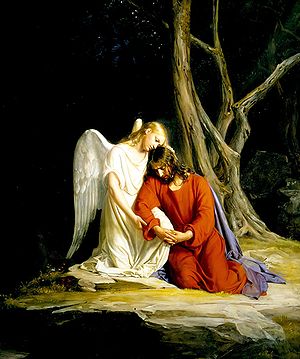As you probably know, the Supreme Court upheld the constitutionality of ObamaCare. I’ll leave it to political websites to debate, praise, and criticize the ruling. My concern now turns toward the Health and Human Services Mandate which will require businesses and organizations to cover contraception expenses regardless of their religious beliefs. What are we, as people of faith, going to do about this assault on our freedom of religion? How can the rosary help us find God‘s path and the strength to follow Him?

If the Supreme Court had ruled ObamaCare and the individual mandate unconstitutional, then the HHS mandate would have become a moot point. The only way the government could require people to provide contraception coverage in a health care plan was through the authority granted somewhere in the 2,700+ pages of the ObamaCare law. This “silver bullet” approach to striking down the HHS mandate reminds me of the First Sorrowful Mystery — The Agony in the Garden. Jesus prayed to God to spare Him the agony of the Passion and Crucifixion. Jesus said in Matthew 26:39, “My Father, if it is possible, let this cup pass from me.” And that is exactly what people of faith asked the Supreme Court. We asked, “if possible, please strike down ObamaCare so we won’t have to fight the HHS mandate.” But Jesus did have to suffer through the Passion and Crucifixion much like we will have to suffer through many fights ahead regarding ObamaCare , the HHS mandate, and other violations of our religious liberty.
But don’t give up all hope. God’s plan for Jesus involved suffering through the Passion as we see in the Fourth Sorrowful Mystery of Jesus taking up His cross. But God was with Jesus through it all. God gave Jesus the strength to get up every time He fell under the cross’ heavy burden. And so find ourselves, under the heavy burden of the HHS mandate as one of our crosses. But similarly to how God gave Jesus the strength to continue despite His suffering, God gives us the strength to fight the good fight.
Now is the time to pray much like Jesus did in the Garden of Gethsemane. But we need to follow up that prayer with action. When your priest preaches about the HHS mandate and how it threatens our religious liberty in a homily, tell him after Mass that you agree and support him. People who are on the front lines of this battle, like priests and bishops, need to know they have our support and they aren’t just fighting this alone. We need to educate ourselves and then educate others on the implications of the HHS mandate (see the video below for a quick primer). We need to let our politicians know that we will not vote for or support those who think the government can arbitrarily give and take away our inalienable rights such as our freedom of religion.
Jesus suffered, but ultimately redeemed us all through His Resurrection. The sorrows and suffering in His Passion and Crucifixion only made God’s ultimate triumph that much more spectacular and meaningful. Who knows? Maybe this whole HHS mandate battle will ultimately convert and save many more souls than if the Supreme Court had simply ruled against ObamaCare. God sometimes works in mysterious ways like that.
Here are some more resources on how you can contribute to our defence of religious liberty:
[youtube]B6IDTkJAcdY[/youtube]
- The Colson Center has developed a page with regular updates on the religious liberty questions still in play.
- The Becket Fund is another create resources for learning about the legal battles that lay ahead.
- And one of my personal favorites is the stophhs.com lead by radio host Al Kresta
Related articles
 Did Michelle Obama just make the Catholic Church argument against the HHS contraception mandate?(hotair.com)
Did Michelle Obama just make the Catholic Church argument against the HHS contraception mandate?(hotair.com)
 Obamacare’s Legal Battles Continue in HHS Mandate Cases(foundry.org)
Obamacare’s Legal Battles Continue in HHS Mandate Cases(foundry.org)
 Sen. Rand Paul Reacts to SCOTUS Ruling on Obamacare: “This now means we fight every hour, every day until November to elect a new President and a new Senate to repeal Obamacare”(reason.com)
Sen. Rand Paul Reacts to SCOTUS Ruling on Obamacare: “This now means we fight every hour, every day until November to elect a new President and a new Senate to repeal Obamacare”(reason.com)
 This is the Beginning, Not the End of the Legal Challenges to the HHS Mandate(publiccatholic.com)
This is the Beginning, Not the End of the Legal Challenges to the HHS Mandate(publiccatholic.com)
 Articles: Still a BFD, Obama Loses(twtface.com)
Articles: Still a BFD, Obama Loses(twtface.com)
 A Sampling Of Obamacare Ruling Fallout(personalliberty.com)
A Sampling Of Obamacare Ruling Fallout(personalliberty.com)



